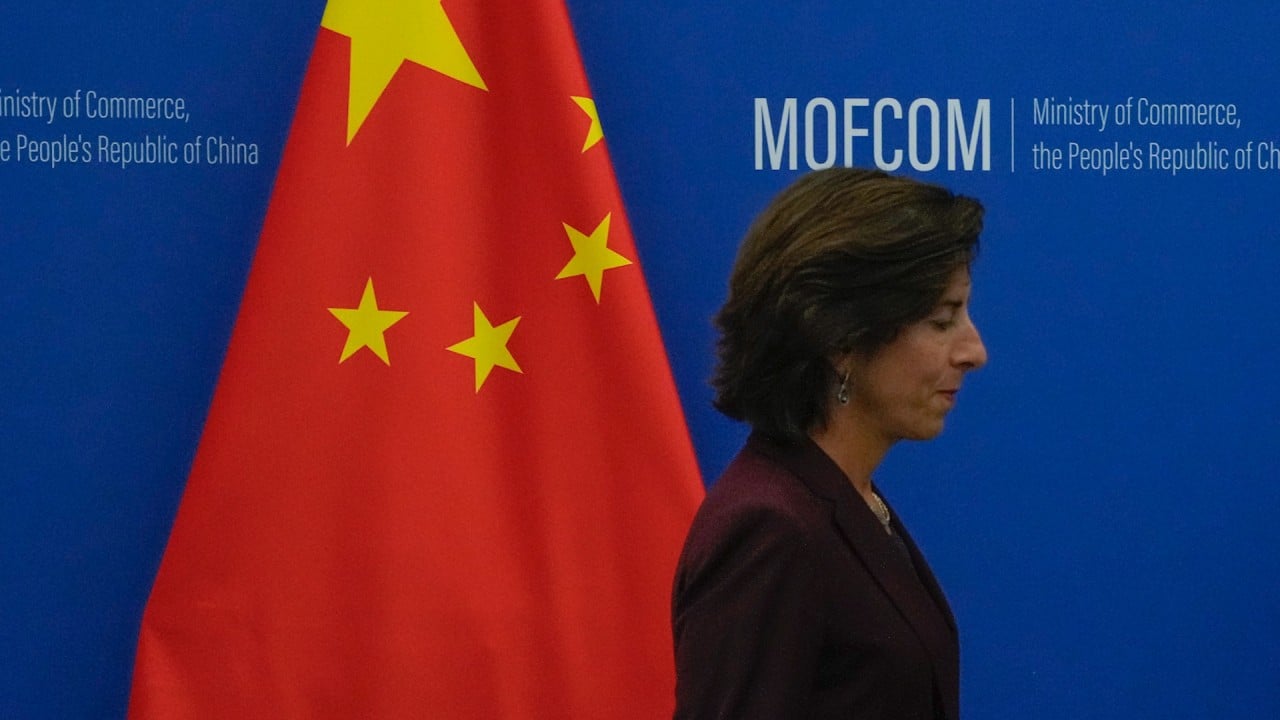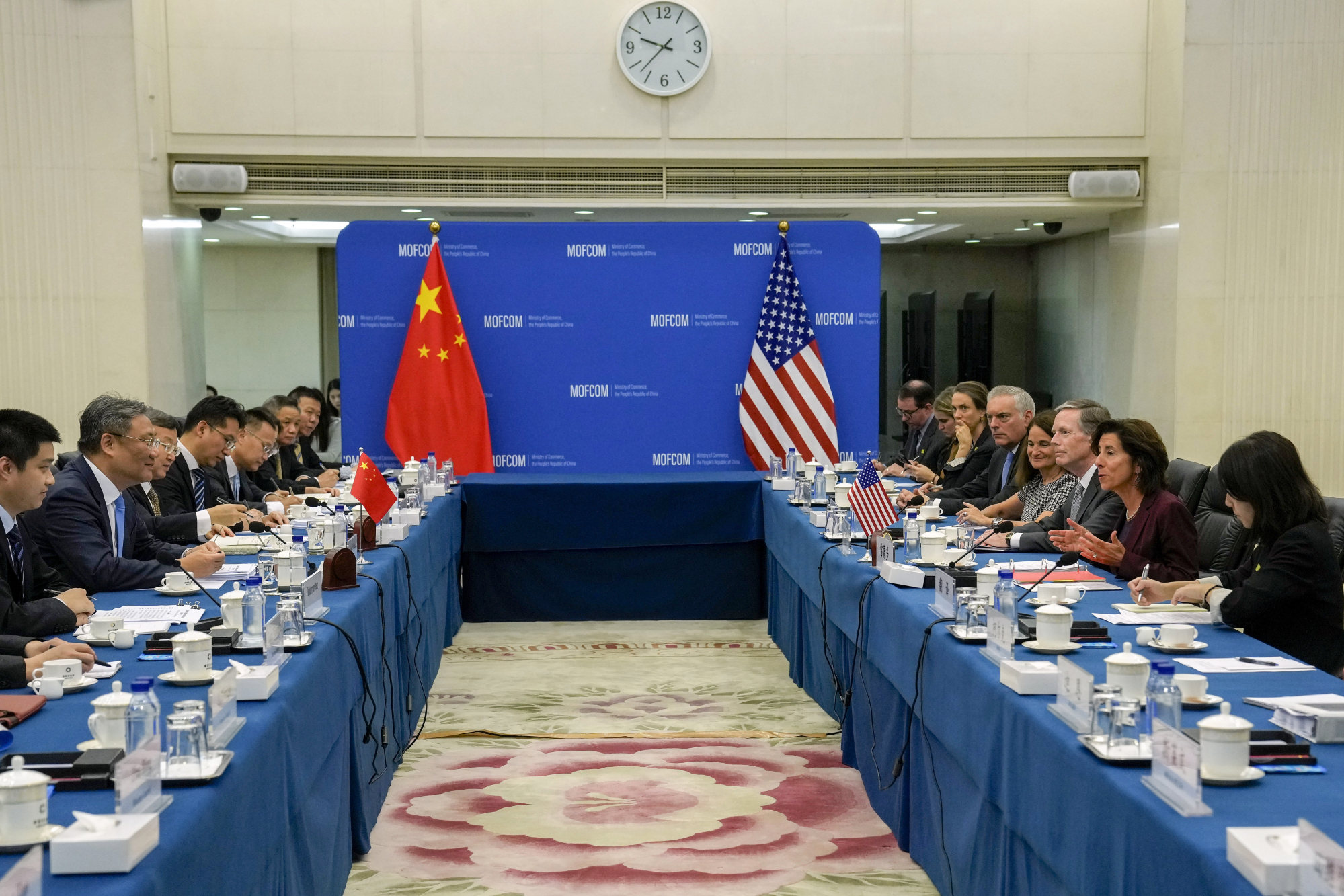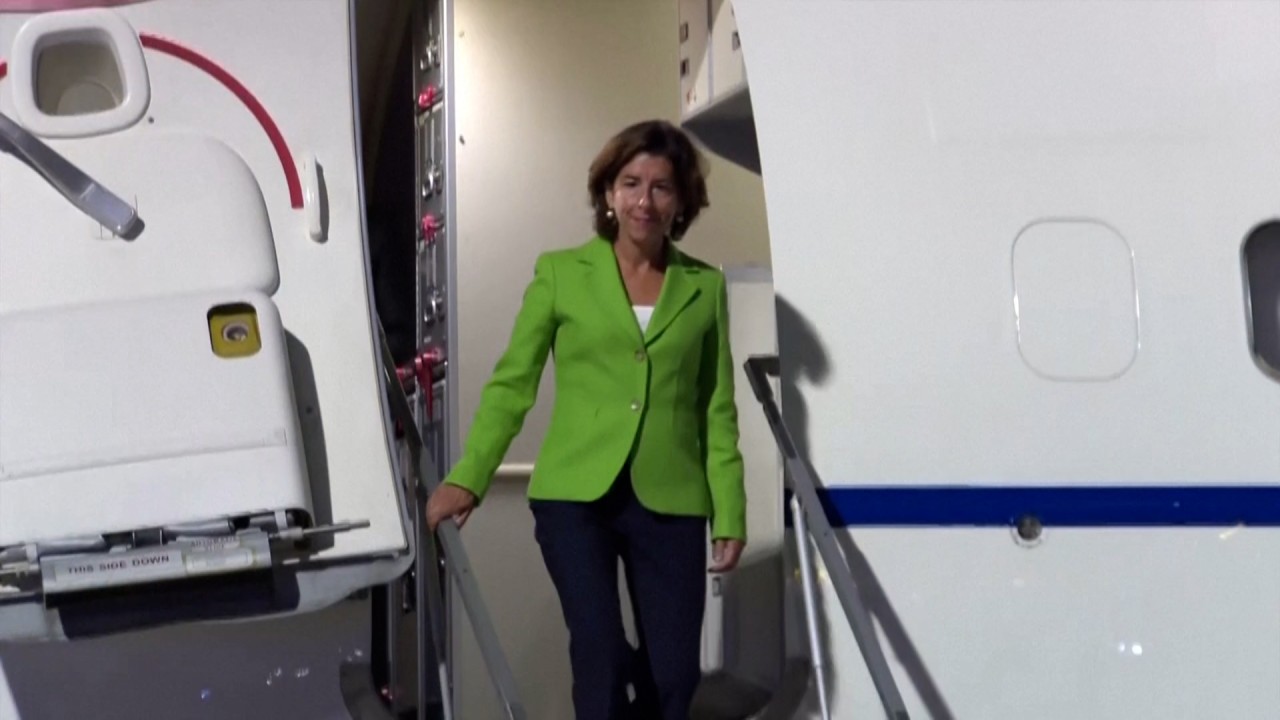
03:03
US-China relations depend on strong economic ties, says US commerce chief during talks in Beijing
US-China talks: Gina Raimondo says economic stability in relations is ‘what the world expects from us’
- Source says the US commerce secretary may visit Boeing Shanghai amid rising expectations that Boeing could resume delivery of 737 MAX jets to China
- Gina Raimondo is the fourth high-ranking US official to visit China in recent months, as tensions remain despite efforts to enhance communication
Strong economic ties between the world’s two largest economies will play a key role in managing their differences and easing political tensions, US Commerce Secretary Gina Raimondo said on Monday during talks with Chinese officials in Beijing as both countries try to put relations on a firmer footing.
In addition to meeting her counterpart, Wang Wentao, she was also expected to meet Premier Li Qiang and Vice-Premier He Lifeng, China’s lead in the bilateral trade negotiations, according to a source with knowledge of the issue.
It’s a complicated relationship; it’s a challenging relationship
“We share US$700 billion of trade, and I concur with you that it is profoundly important that we have a stable economic relationship, which is to the benefit of both of our countries and is, in fact, what the world expects of us,” Raimondo said before meeting Wang.
“It’s a complicated relationship; it’s a challenging relationship. We will, of course, disagree on certain issues, but I believe we can make progress if we are direct, open, and practical.”
While few concrete “deliverables” are expected this week, the two sides are trying to put machinery in place that can lead to concrete progress in the future.
On Monday, during two hours of “rational, candid and constructive” talks, followed by an equally long lunch, Raimondo and Wang agreed on four procedures intended to ease long-standing trade and economic distrust and bolster communication.
How high will the fence be? China’s grave concerns over US tech investment curbs
According to US and Chinese readouts, the two sides will set up a new government and private sector working group that will discuss and seek to resolve commercial, trade and investment problems. The group will meet twice a year at the vice-ministerial level, with the first session in Washington in early 2024.
They also agreed to create a review mechanism involving US export control enforcement in hopes of reducing “misunderstanding of US national security policies”.
The Biden administration has said it is pursuing a carefully targeted “small yard, high fence” approach built on clear national security and human rights objectives that are “not about containing China’s economic growth”. China has been sceptical of this reasoning.

The export-control meetings, held at the assistant secretary level, start on Tuesday at the Commerce Ministry in Beijing.
And in two other steps, US and Chinese trade officials agreed to hold periodic technical discussions on better protecting trade secrets and confidential business information during licensing proceedings; and to communicate regularly at the secretary and minister level about commercial and economic concerns, including in-person meetings at least annually.
The two sides also discussed their respective frustrations. Washington reportedly raised Chinese restrictions on US companies, including Intel and Micron Technology, and on gallium and germanium exports.
Beijing also complained about US semiconductor policies, two-way investment restrictions, discriminatory subsidies and sanctions on Chinese companies.
Wang also argued that overly broad national security claims undercut trade, fair competition and global supply chains.
“Economic and trade relations are the ballast of Sino-US relations,” the Chinese side said, according to its readout.
Raimondo is scheduled to visit Shanghai on Tuesday and stay overnight.
Another source said that her Shanghai stop was expected to include visits to New York University Shanghai and Boeing Shanghai.
Her trip came amid rising expectations that Boeing may resume delivery of its 737 MAX jets to China for the first time since 2019 after it was grounded following two fatal crashes.
A growing Chinese economy that plays by the rules is in both of our interests
Xiamen Airlines, a subsidiary of China Southern Airlines, said on Monday that it was opening up bids to leasing companies to fund four new 737 MAX-8 jets that it needs for this year.
Raimondo was also scheduled to deliver a speech at a women’s event in Shanghai on Wednesday morning.
The commerce secretary, known for her tough line on China, said at the Monday meeting with Wang that “there is no room to compromise or negotiate” on matters of national security. She added, though, that US moves are “not intended to hinder China’s economic progress” and that the US seeks “healthy competition with China”.
“A growing Chinese economy that plays by the rules is in both of our interests,” she added.
Wang said at the same meeting that China was willing to work with the US to create a “sound policy environment for business cooperation between the two countries”. But this must be based on principles of mutual respect, he stressed.
Figures unadjusted for inflation from the US Commerce Department showed that the value of imports from China totalled US$203 billion in the first half of this year, down 25 per cent from a year earlier. And for the first seven months, Chinese customs figures showed a year-on-year fall of 18.6 per cent to US$281.7 billion for its shipments to the US.
Washington has tried in recent months to convey the message that it is de-risking, rather than decoupling, from China, even as it has stepped up technology curbs on China.
The US has repeatedly stated that it does not seek to decouple from China, and we hope the US will implement its statement
“The US has repeatedly stated that it does not seek to decouple from China, and we hope the US will implement its statement,” the Chinese side said in its Monday readout.
The US Commerce Department’s Bureau of Industry and Security announced last week it was dropping 27 Chinese entities from its unverified list of export control restrictions, a move welcomed by Beijing as conducive to normal trade.
Analysts said that this modest concession helped grease the wheels for Raimondo’s trip.
“It also suggests that the Biden administration is making modest but measurable progress with Beijing in re-establishing limited government-to-government communication and cooperation,” said Anna Ashton, US-China director with the Eurasia Group.
“But geopolitical differences and domestic pressures will limit the areas where progress is feasible.”
The Commerce secretary arrives in China juggling conflicting pressures from US industry, Congress and different parts of the administration, others said. “Gina Raimondo is really stuck between a rock and a hard place,” said Nazak Nikakhtar, a partner with Washington's’s Wiley Rein law firm and a former Commerce Department official, who sees little of substance coming out of the visit.
Overall, the US has doubled down on its “carefully targeted” strategy aimed at restricting Beijing’s access to advanced technologies.
The plan and the hope is that our commercial relationship, if done right, can stabilise the political relationship
Speaking at an event showcasing American health and beauty businesses later on Monday, Raimondo said that most US-China trade has nothing to do with national security, and that it is possible to promote and protect exports, according to Bloomberg.
“The plan and the hope is that our commercial relationship, if done right, can stabilise the political relationship,” she said, echoing comments by the Chinese side.
The two countries have increased their communications this year. In the last three months, Biden sent Secretary of State Antony Blinken, Treasury Secretary Janet Yellen and special climate envoy John Kerry to China for talks.
Raimondo’s China itinerary differs from those of her counterparts, given the stop in Shanghai. A third source said Raimondo might meet Shanghai’s Communist Party chief and perhaps visit Shanghai Disneyland.



